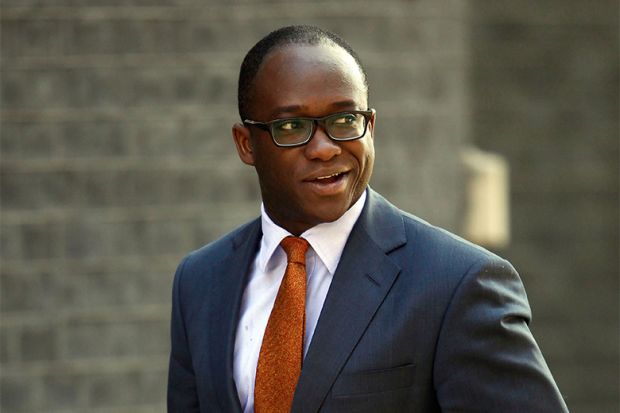Universities minister Sam Gyimah has rejected claims that the credibility of England’s new higher education regulator has been damaged by an “absolutely damning” report that detailed high-level political interference in its appointment process.
Asked if he believed that revelations about the ministerial meddling that saw Toby Young appointed to the Office for Students board had hurt the organisation, Mr Gyimah said that he “did not think so”, stating that the controversial journalist, whose appointment led to a national outcry, had been just one of a 15-strong board.
Speaking to journalists at the launch of the OfS’ new regulatory framework on 28 February, Mr Gyimah said that the watchdog’s chair Sir Michael Barber had “great credibility” and that Mr Young, who stepped down nine days into the job after controversial statements about eugenics and women’s breasts came to light, had only “been a non-executive member”.
His comments follow Mr Gyimah’s statement to the House of Commons on 27 February following the publication of a report by the Commissioner for Public Appointments, which found that its code had been breached on more than one occasion.
The report was described in Parliament as “absolutely damning” by Labour MP Lucy Powell, while John Spellar MP denounced the “outrageous dogma-driven choice” of Mr Young as an example of a “self-perpetuating quangocracy that looks after the great and good” – a reference to efforts by Jo Johnson, the former universities minister, to get Mr Young to apply for the job.
At the OfS event in London, Mr Gyimah admitted that “no-one would have wished what has happened [to have happened]” and “things could have done better”. He also insisted that there now was “proper student representation” on the OfS board after the report found that Downing Street advisers had moved to block approved student members because of their history of student union involvement.
Ruth Carlson, a University of Surrey engineering student chosen to fill the student experience board seat – whom Mr Gyimah described in Parliament as having “no discernible political views” – was a “fantastic” appointment, he said.
In his speech to the OfS conference, Mr Gyimah said that the creation of the OfS’ new framework – which he called the “biggest shakeup to higher education in 30 years” was “vital” and “timely” because “the UK’s knowledge economy rests on harnessing all the creativity, ingenuity and excellence in our universities”.
The new body would help to address questions of “value for money, the size of the graduate premium…and the role and purpose of universities” raised not just by students, but by “anxious parents and grandparents worried about student fees”, he said.
Recent criticisms of universities did not represent “a sort of annus horribilis for higher education, a storm to be weathered in the hope of calmer times ahead,” Mr Gyimah said, adding: “This is not a blip.”
“To paraphrase one Conservative prime minister [Harold Macmillan], we are once again experiencing ‘winds of change’ in the university sector,” Mr Gyimah continued.
“Gone are the days when students venerated institutions and were thankful to be admitted,” he said, adding: “We are in a new age – the age of the student.”
Mr Gyimah added that, while the new higher level of scrutiny of universities “may feel to some in the sector like a revolt [but] is more like a revolution – a revolution pushing the sector to greater responsibility and accountability to students”, he wanted universities to “embrace – not fight – this change”.

